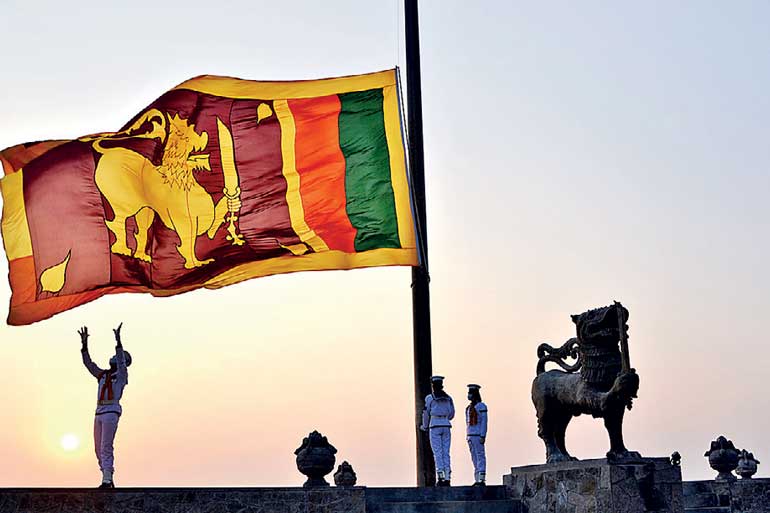Tuesday Feb 17, 2026
Tuesday Feb 17, 2026
Tuesday, 15 June 2021 02:33 - - {{hitsCtrl.values.hits}}

When compared to the resolutions on the Philippines and Pakistan the resolution on Sri Lanka is less harsh. The resolution on Sri Lanka does not call for immediate action to revoke GSP+. It only calls the EEAS to use the GSP+ as a leverage to push for advancement on Sri Lanka’s human rights obligations and, as a last resort, to initiate a procedure for the temporary withdrawal of Sri Lanka’s GSP+ status
 The European Parliament’s resolution (on 10 June) inviting the European Commission to consider temporarily withdrawing Sri Lanka’s access to the Generalised Scheme of Preferences Plus (GSP+) concession has started an interesting discussion on the impact of the resolution on Sri Lanka. But the ongoing discussions overlook two important aspects about this resolution.
The European Parliament’s resolution (on 10 June) inviting the European Commission to consider temporarily withdrawing Sri Lanka’s access to the Generalised Scheme of Preferences Plus (GSP+) concession has started an interesting discussion on the impact of the resolution on Sri Lanka. But the ongoing discussions overlook two important aspects about this resolution.
Firstly, though, as one of three legislative branches of the European Union, the European Parliament has legislative power, it does not formally possess the right to initiate action on the resolutions. That power lies with the EU Commission. Secondly, the resolution on Sri Lanka was the third of such resolutions adopted by the Parliament, during the last 10 months. The other two resolutions were on the Philippines and Pakistan.
The purpose of this article is to provide preliminary analysis on these three resolutions. This may help readers to understand the implications of the resolution on Sri Lanka from a different and, perhaps, more informed perspective.
The resolution on the Philippines
In September last year, the European Parliament adopted a resolution calling on the Commission to immediately kick the Philippines out of the GSP+ over its human rights violations, particularly over President Rodrigo Duterte’s “questionable human rights record”.
The resolution made specific references to “…thousands of people, including women and children, …reportedly, killed (since 1 July 2016)” during President Duterte’s ‘war on drugs’…. threats, harassment, intimidation, and violence against those speaking against the allegations of extra-judicial killings and other human rights abuses, including human rights defenders, journalists, and activists, and the conviction of Maria Ressa, Editor of a news website, for cyber libel by the Manila Regional Trial Court.
The Philippines’ response
Presidential Spokesperson Harry Roque, when asked about the resolution, had responded: “Stop the discussions. They should do what they want to do during this time. If they want to implement it, go ahead…. I'm sorry I'm being very undiplomatic in my answer, but what else can I say? At the time of a pandemic, they're threatening us. Oh my God, what else do we lose?"
That kind of response was not unexpected from Malacañang Palace. Earlier President Duterte had referred to EU officials as "stupid European Union guys," and had even threatened to expel all European diplomats within 24 hours after Brussels criticised major human rights abuses committed by his Government.
However, Trade Secretary Ramon Lopez was more diplomatic in his approach and had simply stated that “the main agency that has a say in the GSP+ was not necessarily the European Parliament but the European Commission, which has a mechanism to verify issues before sanctions are imposed…. Filipino officials have been able to explain objectively the Philippines’ side on issues that are raised and we don’t see any reason why our GSP+ privilege will be withdrawn.”
Speaking to the Philippine News Agency, Lopez had also underlined “So far, we’ve been faring well in all issues that were raised every year. And I think this is the third, or fourth time, that the EU Parliament has passed the same resolution. And every year, we are able to give our side, give our explanation, give our information and numbers. So, we shall be addressing this again in this process of monitoring,”
What he did not mention was that in March 2017, European Trade Commissioner Cecilia Malström also delivered a strong message listing human rights concerns which included “the killings linked to Duterte’s abusive ‘war on drugs,’ the looming reinstatement of the death penalty, and lawmakers’ efforts to lower the age of criminal responsibility to nine years of age” and indicated that unless the Philippines took action to address the EU’s concerns, the Philippines risks losing GSP+ trade concession.
The resolutions on Pakistan
In April this year, the European Parliament adopted a resolution calling for a review of the GSP+ status granted to Pakistan. Pakistan was charged with an "alarming" increase in the use of blasphemy accusations and the increasing number of online and offline attacks on journalists and civil society organisations and called on the Government of Pakistan to "unequivocally condemn" incitement to violence and discrimination against religious minorities in the country. The Parliament expressed "deep concern" at the prevailing anti-French sentiment in Pakistan.
The resolution called on “…the Commission and the European External Action Service (EEAS) to immediately review Pakistan’s eligibility for GSP+ status in the light of current events and whether there is sufficient reason to initiate a procedure for the temporary withdrawal of this status and the benefits that come with it, and to report to the European Parliament on this matter as soon as possible."
After the debate on the resolution, one of the co-authors of the resolution Member of European Parliament (MEP) Charlie Weimers of Sweden tweeted: "Should Europe reward Pakistan’s mob justice targeting Christians and its Prime Minister relativising the Holocaust? My answer is no."
Pakistan’s response
Responding to the resolution, Human Rights Minister Pakistan Shireen Mazari had said it is unfortunate that the co-sponsor of the EU's anti-Pakistan resolution was a member of a party that the Swedish PM Stefan Lofven referred to as 'a neo-fascist single-issue party' with 'Nazi and racist roots', " and asked whether “… GSP Plus is getting muddied in Islamophobia?" However, she also tweeted: "We have issues to resolve but there has been more movement now on our Human Rights International Convention commitments than in previous governments. The way forward is dialogue & negotiations, which we have been doing, not extreme public positionings. Unfortunate."
The Pakistani Foreign Ministry was more diplomatic in the response and the statement said: “The discourse in the European Parliament reflects a lack of understanding in the context of blasphemy laws and associated religious sensitivities in Pakistan – and the wider Muslim world. The unwarranted commentary about Pakistan’s judicial system and domestic laws are regrettable…Pakistan is a parliamentary democracy with a vibrant civil society, free media, and independent judiciary, which remains fully committed to the promotion and protection of human rights for all its citizens without discrimination.”
The FO had said Pakistan is proud of its minorities who enjoy equal rights and complete protection of fundamental freedoms as enshrined in the Constitution. Judicial and administrative mechanisms and remedies are in place to guard against any human rights violations.
“Pakistan has played an active role in promoting freedom of religion or belief, tolerance, and interfaith harmony. At a time of rising Islamophobia and populism, the international community must exhibit a common resolve to fight xenophobia, intolerance, and incitement to violence based on religion or belief and work together to strengthen peaceful co-existence."
The resolutions on Sri Lanka
The resolution on Sri Lanka, in most aspects, is similar to the other two resolutions. However, there is one distinct difference in the paragraph in the resolution on Sri Lanka which call the Commission and the European External Action Service to initiate action. The relevant paragraphs in the resolutions on the Philippines and Pakistan are given below;
“Given the seriousness of the human rights violations in the country, calls on the European Commission, in the absence of any substantial improvement and willingness to cooperate on the part of the Philippine authorities, to immediately initiate the procedure which could lead to the temporary withdrawal of GSP+ preferences;”
“Calls on the Commission and the European External Action Service (EEAS) to immediately review Pakistan’s eligibility for GSP+ status in the light of current events and whether there is sufficient reason to initiate a procedure for the temporary withdrawal of this status and the benefits that come with it, and to report to the European Parliament on this matter as soon as possible;”
In these resolutions the Commission is called to take immediate action to withdraw the concessions. However in the resolution on Sri Lanka the language is milder.
“Calls on the Commission and the European External Action Service (EEAS) to take into due account current events when assessing Sri Lanka’s eligibility for GSP+ status; further calls on the Commission and the EEAS to use the GSP+ as a leverage to push for advancement on Sri Lanka’s human rights obligations and demand the repeal or replacement of the PTA, to carefully assess whether there is sufficient reason, as a last resort, to initiate a procedure for the temporary withdrawal of Sri Lanka’s GSP+ status and the benefits that come with it, and to report to Parliament on this matter as soon as possible;”
After the Parliament passed the resolution on the Philippines, one of the co-authors of the resolution, EU Parliament Member Hannah Neumann pointed out: “We don't have these many tools in the EU to protect human rights and democracy, and maybe our trade policy is the strongest one… (the Philippine) still enjoys trade privileges of the EU under the GSP+ scheme that are supposedly linked to improvements in human rights, … We call on the commission to start on the procedure to revoke these privileges immediately. To be frank, by immediately, we mean by Monday."
That was in September 2020. Since then, many Mondays have passed but the Commission had not initiated any action to revoke the GSP+ concessions.
More importantly, after the resolution was adopted by the European Parliament, a European Commission spokeswoman had spoken to a reputed garment industry trade journal ‘Just-Style’ and had said that the Philippines is "engaging constructively" in “the GSP+ monitoring process, which will be followed up in the next joint monitoring mission to the Philippines planned by the Commission and the European External Action Service, when COVID-19 conditions allow.”
She had also stated "The EU's current policy focuses on actively pursuing the GSP+ monitoring process, that is, an open dialogue with the Philippines on our areas of concern and how to progress to alleviate these concerns, rather than to initiate a process to withdraw GSP+ preferences."
It is only a few weeks since the resolution on Pakistan. So it is difficult to comment on the action or inaction the commission had initiated. Once again the resolution calls for immediate review. When compared to the resolutions on the Philippines and Pakistan the resolution on Sri Lanka is less harsh. The resolution on Sri Lanka does not call for immediate action to revoke GSP+. It only calls the EEAS to use the GSP+ as a leverage to push for advancement on Sri Lanka’s human rights obligations and, as a last resort, to initiate a procedure for the temporary withdrawal of Sri Lanka’s GSP+ status.
So, the question then is, will the action by the Commission on the resolution on Sri Lanka also be less harsh than the actions they had taken on the Philippines?
The writer is an independent consultant on trade policy, trade promotion and trade negotiations. Previously, he served as the Director General of Commerce of Sri Lanka and was also former Ambassador of Sri Lanka to the WTO.